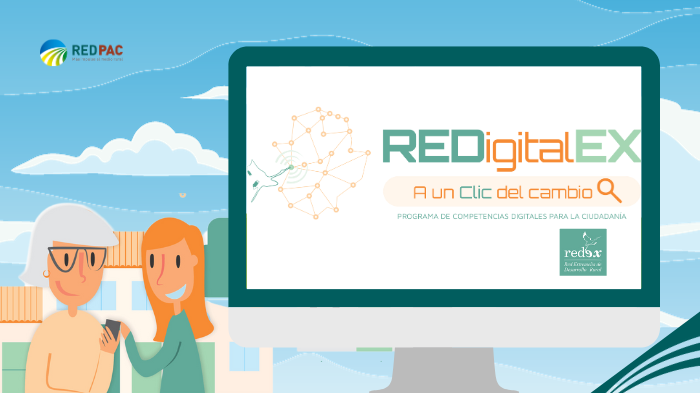
01 de December de 2023
The courses have a predominantly practical focus, without large theoretical sections, to help the public acquire knowledge in separate sessions totaling up to 7.5 hours.
- The project has begun with in-person classes during November and December, and will expand its offering with a blended format in 2024.
- The goal is to help the elderly, women, and areas of particular demographic decline.
The adoption of basic digital skills is increasingly a requirement within the type of society we live in. Computers, mobile phones, and other digital devices no longer serve solely as a means of socialization; their use as bureaucratic tools, for carrying out administrative tasks or learning the most basic information necessary for the daily functioning of normal life, is now well established.
That's why acquiring basic knowledge on how to use these devices is key for everyone, regardless of age. In Extremadura, 32.4% of the population has low or no digital skills, according to the National Statistics Institute ( INE ), and it is this group that the Extremadura Rural Development Network ( REDEX ) has targeted . with his latest project.
The "Digital Skills Program for Citizenship," abbreviated as REDigitalEX , was launched this year to provide digital skills to those with limited skills. Thanks to the collaboration of the autonomous community's Local Action Groups ( LAGs ), the project has organized a series of virtual classes that will begin in early 2024.
Surfing the net
The project began this November to focus on several in-person courses:
- Handling virtual assistants such as Alexa or Google.
- Creating Family Link for families
- Development of healthy habits in the use of technologies.
- Creating content for social networks in Reel format.
- Use of different collaborative tools in the Google environment, such as Drive and video calls.
However, REDEX is now touring the various regions to present the digital and blended learning courses, which will be delivered through a platform that supports up to 500 people at a time.
Local adaptation
The courses have a predominantly practical focus, without large theoretical sections, to help the population acquire knowledge in separate sessions totaling up to 7.5 hours.
"As the courses are short, the content is adapted to the needs of the group," Nazaret Mañoso, the program's communications specialist, explained to the PAC Network . "We have focused on understanding the territory of each of the regions," she said, adding that the course content will vary and be adapted to each group and location according to their prior knowledge and needs.
The program is also divided into several age groups to maximize the adaptability and customization of the content. The groups are 0-17 years old, 18-29, 30-54, and 55 and older, with special attention to:
- People in training
- People in rural areas in training
- People without studies or with primary education in training
- Active people (employed or looking for work) in training
- Women in training
- Women in rural areas in training.
- Women without education or with primary education in training.
Furthermore, the current in-person training sessions are serving as an important first step: "The feedback has been very positive. The amount of information we've received is abundant and enlightening," says Mañoso. "A major push is needed, and we know this is an aging population, often far removed from everyday electronic procedures."
The REDigitalEX courses will be free and will run for the next two years. Furthermore, those responsible hope to boost training in areas with significant demographic decline and contribute to closing the gender gap.
Partners and financing
The REDigitalEX project is managed by the Extremadura Rural Development Network and has the support of the 24 LAGs in Extremadura. The Digital Skills for Citizens Program is also included in the Spanish Government's Recovery, Transformation, and Resilience Plan for the period 2021-2023, funded by the European Union through the Next Generation EU funds .
The European Commission's commitment is to train a minimum of 15,774 people in 2023, 2024, and 2025 (3,883 citizens in the fourth quarter of 2023), with the amount allocated for this purpose amounting to €3,312,476.











